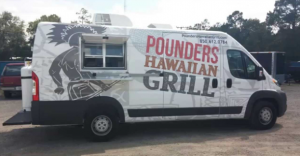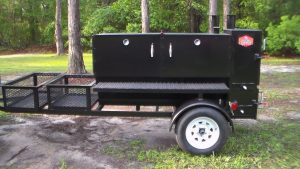Life as the owner of a successful food truck can sometimes feel like it’s going to swallow you up. If you’re not actually on the truck cooking for your customers, you’re running around town sourcing those hard-to-find ingredients that make your culinary creations unique.
You’re constantly in some state of breaking down or setting up, from draining fryers to filling water tanks to scrubbing surfaces. You’re handling endless last-minute emergencies, whether it’s an empty propane tank, a generator that refuses to start, or a zero-hour run on the artisanal sour mustard pickles that’s left you short stocked for the weekend.
Even when all is going reasonably according to plan, running a successful food truck can feel a little like trying to put out a fire in a hurricane; as soon as one issue is seemingly handled, another emergency pops up that demands your attention. For many of us, keeping a lid on all of that chaos while riding the ebbs and flows of adrenaline is what attracts many of us to the business in the first place. And after all, the constant ringing of the till and the endless stream of satisfied customers makes it all worth it, right?

Hawaiian Food Truck Built by M&R Specialty Trailers and Trucks
The problem is, building a life around responding to a series of emergencies, which is essentially what the food truck business is, can eventually take its toll on both your physical and your mental well being. Even if you wake up each day feeling like you’re crushing it, the effects of this kind of food truck burnout can begin manifesting themselves in many subtle ways, all of which are detrimental to both you and your business.
The fact is, it’s hard to give 100% of yourself to your performance each and every single day, and so subconsciously, you may find your brain making concessions or taking shortcuts that you wouldn’t otherwise allow. Garnishes get sloppy. Food that you know isn’t made exactly right gets sent to customers anyway. Your cleaning regimen gets back-burnered. Or worse, your on-the-job performance doesn’t suffer, but your personal life begins to take a hit: Friends disappear. Women leave. Kids don’t recognize you. Your sleep patterns change. Substance abuse. Rapid weight loss or gain. Depression. Anxiety. DEATH.
Okay, okay, let’s back up a second. Running a food truck probably isn’t going to kill you. But there are certainly days where it feels like it might. Let’s take a look at a few ways to stop this anxiety train from steamrolling through your life, keep your brain clear, happy, and healthy, and keep your business going strong, by avoiding food truck burnout.
Consider your schedule carefully, and evaluate whether you can afford an extra day off.
Look, I get it: The food truck business can feel like a little bit of a “smash and grab” affair, and you need to make your money, when you can make it, during the few hours you have each day or worse, each season. This knowledge drives many of us to an always-on, rain or shine, seven-day-a-week schedule. After all, you never know when the next rainstorm is going to send customers scurrying, or when a price spike on chicken tenders is going to punch massive holes in your bottom line.
But here’s the thing: You can’t live your entire life on your food truck. Sure, you have to be committed, show up, and work hard. But it’s equally important to schedule parts of your life that are completely unrelated to your business; time to spend with family or friends, or to invest in other interests completely unrelated to restaurant work or antique step van repair and maintenance.

BBQ Trailer built by M&R Specialty Trailers and Trucks
Take a hard look at your weekly sales reports, and see if you notice any trends. If you’re barely breaking even on a Sunday, for example, you might consider shuttering the truck for that day, to allow you time to address the other details of your life. Or if breakfast sales aren’t going as well as you’d hoped, consider scrapping them and reinvesting the time in your other, non-food-truck pursuits. Leaving time for other things will give your brain a chance to rest, and you may find you approach your next “open” day with a renewed vigor and passion.
Focus on your skills, and what you can realistically provide to your customers.
We all have dreams of what our food business will ultimately become. Maybe we want to expand to a brick-and-mortar location one day. Maybe we want to be featured in a local (or national!) magazine. Maybe it seems like a matter of time before Guy Fieri shows up in his big shorts, to tell us how “money” our chipotle lime aioli is. And while big dreams and goals like these are important, they can also become oppressive when they don’t happen as quickly as we might like.
Instead of becoming frustrated with the fact that you don’t have a nationwide fleet of franchised food trucks that you oversee from the floating lounge chair of your infinity pool, focus on the things that you can achieve, each and every single day. You may not have a yacht in the Caribbean that you can escape to, but you know what you can do?
You can fry an egg perfectly, so that the whites are firmly set, the yolk is still soft, and there’s barely a trace of overcooked frizzle around the edges. You can chop scallions on a bias, so that they look nicer for your hordes of Instagram-savvy customers. You can greet each person who comes to your window with a smile and a sincere “thank you.” Instead of getting distracted by the “big picture” dreams you have, which frankly, may not ever come to pass, focus on the things you can do to achieve excellence every single day.
Set smaller, more realistic goals.
Instead of deciding one day that you are going to become the social media marketing kingpin of your community, or you’re going to become the number one ranked food truck in your town on Tripadvisor, or even that you’re going to make the most elaborate bunch of tacos the world has ever seen, figure out how to break these loftier ambitions into smaller, attainable goals. Large projects or problems can quickly become emotionally or physically overwhelming. Instead, find ways to break large projects into smaller, more manageable tasks that you can realistically accomplish each day.
Know when to ask for help…even if that means hiring someone.
I know, I know…part of the allure of running your own business, whether it’s a food truck or a small restaurant, is the romantic image of the “lone gunslinger” who takes the world on his or her shoulders, juggling 1,000 different responsibilities and thus taking total responsibility for the overall success or failure of the business. But for most of us, these responsibilities will snowball until they become simply too much for one person to handle singlehandedly, and it’s important to recognize that moment when it comes.
Knowing when to ask for help or hire staff means giving up a certain amount of control, which can be challenging for many small business owners; focus on how having help will enable you to produce more, more efficiently, even if some amount of control is sacrificed along the way. Recognize that there is strength in collaboration, and accept help when the time comes.
Maintain your personal relationships.
Every human being needs validation and support from other human beings. Full stop. But when you become consumed with your food truck business, it can be easy to let some of these other relationships fall by the wayside. Make room in your life for a coffee date with a friend, or a walk around the neighborhood with your kids. And call your mother, wouldja? She’s worried about you.
Read a book. Watch a movie. Build a model rocket.

Built by M&R Specialty Trailers and Trucks.
The point is, do SOMETHING that’s totally unrelated to your food truck or the food business. Give your brain a moment to work on something that has nothing to do with food truck work. Sure, the biographical story of how Glen Bell built the Taco Bell empire is fascinating.
But reading about it is working the same parts of your brain that need a rest. Develop other hobbies or interests that have nothing to do with your business, so that when you DO return to thinking about your next sandwich special, or wondering when you last changed your fryer oil, you’ve had a chance to rest, recharge, and engage the parts of your mind that have nothing to do with food or the food business.
Prioritize your personal health.
“Sure,” you may think, “I don’t get any exercise. But what do you call being on my feet all day in a 130 degree food truck?” Running a food truck can seem like a fitness regimen all on its own, but it can also lead to some unhealthy eating habits and a tendency to use substances as a coping mechanism. Remember to eat a real meal from time to time (particularly one that someone else prepared!), keep the reins tight on your alcohol and tobacco use, and try to establish a regular and restful sleep routine.
Finding the time to prevent food truck burnout can be challenging, especially in businesses as demanding and seemingly all-consuming as ours. But finding ways to occasionally remove yourself from that mental whirlwind of activity will not only help preserve your personal relationships and your own sanity; it will help keep you working safer, smarter, more efficiently, and more creatively. And after all, isn’t that the goal?

Leave A Comment